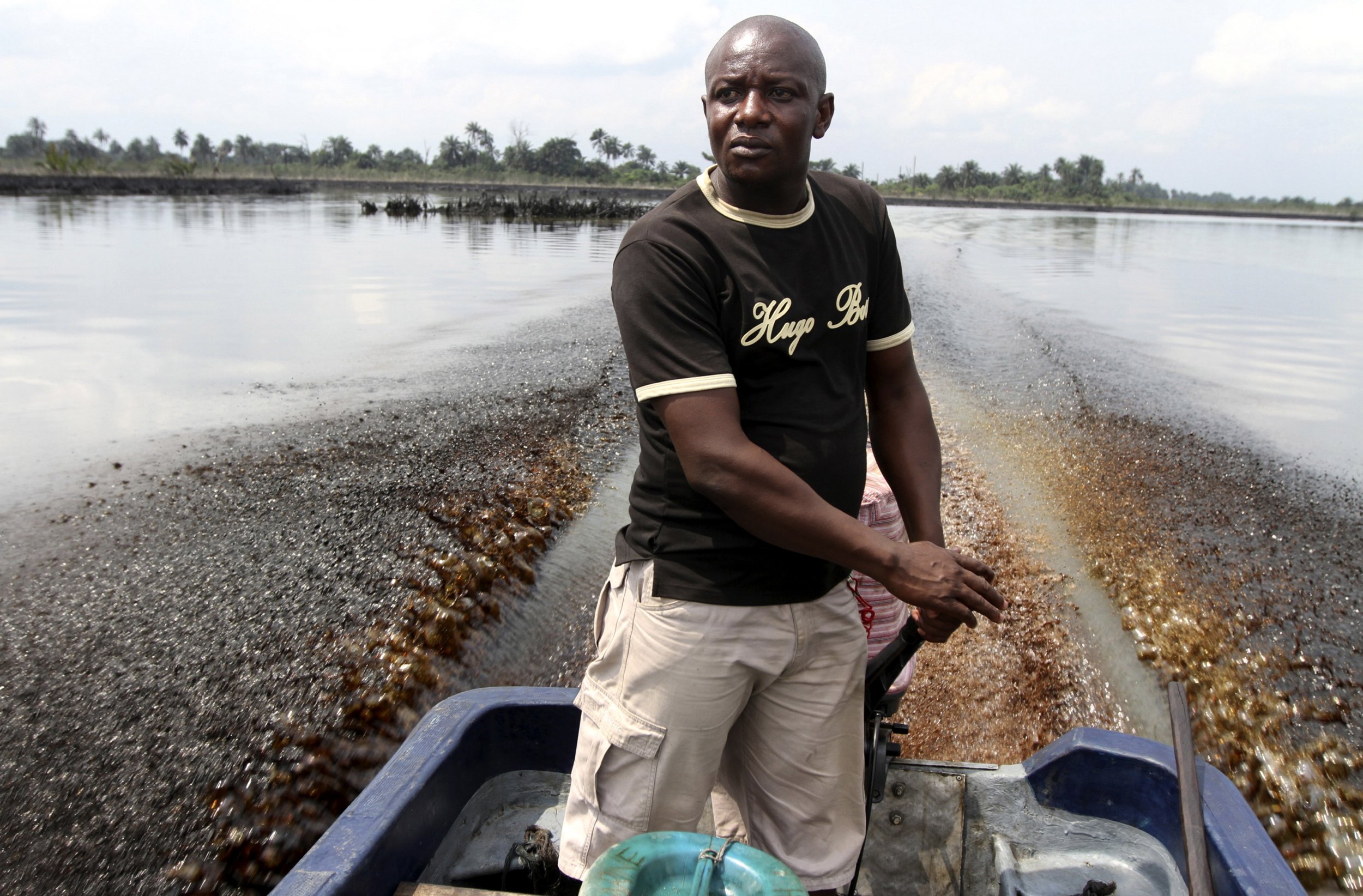
The oil company Shell lied to a Dutch court about steps taken to minimize the risk of oil spills during a court case brought against the multinational oil and gas company by four Nigerian farmers and Friends of the Earth, lawyers acting for the claimants alleged today.
Friends of the Earth (FoE) Netherlands and a group of four farmers from villages in the Niger Delta were aiming to claim compensation from Shell for damages caused when a major oil pipeline burst, causing devastation to local communities.
During the case, which went to court in 2012 in The Hague, Shell's lawyer said that the oil company had taken precautionary steps to avoid oil spills in the Niger Delta, including the installation of a leak detection system, instead blaming the spills on criminal tampering in the area. Due in part to this evidence, say FoE Netherlands, the court ruled that Shell was responsible for one out of the four oil spills.
However, according to lawyers representing the farmers, documents revealed in the UK's High Court this year have shown that there was in fact no leak detection system in place and the Dutch oil company had consistently ignored calls from its own staff to replace the pipeline, despite being told their lifespan was "non-existent or short".
The new evidence available to the farmers may lead to much wider compensation for the communities affected by the spills.
Because of the way in which Dutch courts operate, the farmers who brought the case in 2008 and their legal teams were prohibited from seeing any of the documents submitted by Shell in relation to the claim they were making.
It wasn't until a new lawsuit was filed against Shell in the UK by 15,000 Nigerians in relation to oil spills from the same pipeline in another nearby village, that documents submitted to the High Court by the oil company as part of its defence could be obtained.
Channa Samkalden, the lawyer for FoE Netherlands and the Nigerian farmers who requested Shell's documents from the British court, said: "On the basis of these documents, I can conclude that the testimony on the leak detection system which Shell gave to the court in The Hague in our case is in fact not true."
A spokesperson for Amnesty International told Newsweek: "The farmers were essentially fighting blind. They knew Shell had all had information but could get none of it."
The documents will be submitted to the Dutch court in The Hague by FoE Netherlands lawyers, with the first hearing of the appeal against the 2013 verdict to be held in March 2015.
According to an Amnesty spokesperson: "It is incredibly lucky for the Nigerian farmers that the British case went through, otherwise they would not have seen this." She called the lack of transparency over Shell's dealings in the Niger Delta "staggering".
The documents also revealed that Shell was consistently advised by its own staff in 2002 that the 30-year-old pipeline passing through a network of impoverished Nigerian communities desperately needed replacing.
The court papers include an internal Shell project report dated February 2002, said the company should "initiate an immediate replacement" of the trans-Niger pipeline.
It wasn't until six years later, in November 2008, that the company publicly admitted that there was something wrong when the 24-inch trans-Niger pipeline burst twice within two days, releasing over 100,000 barrels of oil. The full extent of the spill remains unclear.
Geert Ritsema, head of the Energy and Natural Resources Campaign at Friends of the Earth Netherlands said: "Shell has repeatedly surpassed our worst nightmares. We already knew that the company has flaunted the Nigerian legal system, either ignoring its verdicts or endlessly delaying carrying them out. But we are surprised to see that Shell also seems to have so little respect for the Dutch legal system."
Whilst the Dutch legal system means that only individuals, rather than groups, can institute a legal case if they have suffered demonstrable damage through the actions of another, according to Friends of the Earth over 30 million people living in the Niger Delta, most of whom are dependent on agriculture and fishing to survive, are victims of Shell's oil pollution.
"The walls are beginning to close in on Shell. The image that the company would like to present of itself, in the role of the victim instead of the perpetrator, is crumbling more and more," Ritsema continued.
A spokesman for the Shell Petroleum Development Company of Nigeria Ltd (SPDC) said: "We strongly refute any suggestion that SPDC has knowingly submitted false or misleading information to the Dutch court. There are significant differences between the Bodo and Goi spills. SPDC has accepted responsibility for the two highly regrettable operational spills at Bodo, whereas as [Friends of the Earth Netherlands] is well aware, the Dutch court clearly ruled that the relevant oil spills at Goi were caused by sabotage and therefore, quite rightly, dismissed the claims."
"We dismiss any suggestion that SPDC has knowingly continued to use a pipeline that is not safe to operate. The condition of the pipeline is regularly assessed. We are in the process of preparing for the appeal hearing and will respond to [Friends of the Earth Netherlands]'s allegations in that context."
Uncommon Knowledge
Newsweek is committed to challenging conventional wisdom and finding connections in the search for common ground.
Newsweek is committed to challenging conventional wisdom and finding connections in the search for common ground.
About the writer
To read how Newsweek uses AI as a newsroom tool, Click here.






